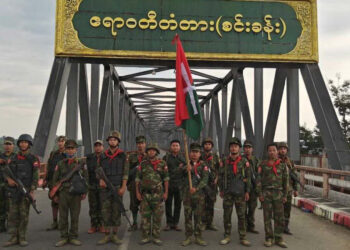DHAKA — Reported restrictions imposed by the NGO Affairs Bureau on the operations of 41 non-governmental organizations working in Rohingya camps in Bangladesh upsets aid workers as they fear their work will be hindered without reason.
The list of NGOs was not made public but a few were listed in various dailies since Aug. 17, stating that their operations in Ukhiya and Teknaf were “banned.”
NGO Affairs Bureau director-general KM Abdus Salam said the restricted 41 NGOs would be allowed to finish their ongoing projects.
“We will be strict with these NGOs when they apply for new projects,” Salam said.
Abdus Salam declined to disclose the names of the NGOs or explain the reason for the restrictions.
Currently, 86 local and 36 international NGOs are implementing various projects along with 11 UN agencies at various Rohingya camps in Bangladesh.
Authorities in Cox’s Bazar, however, said they only heard about the restrictions from newspapers and that they were in the dark.
Cox’s Bazar deputy commissioner Kamal Hossain on Sunday said that he had heard about the ban from the media but that he had received no instructions regarding it.
“I do not know how or why the decision was made,” said refugee relief and repatriation commissioner Mohammad Abul Kalam, the lead officer coordinating refugee and Rohingya issues in Cox’s Bazar.
According to media reports, the 41 NGOs were operating food, sanitation and health services in the camps, where hundreds of thousands of Rohingya are living in grim conditions.
On March 6, the NGO Affairs Bureau set a framework for the local and international aid organizations to bring “transparency and accountabilities” to their activities.
In the framework, the NGOs were asked to provide all information to the Cox’s Bazar district administration and the Refugee Relief and Repatriation Commission regarding development activities, project implementation, funding and employees.
The bureau also asked the organizations to focus on humanitarian activities and to not work after dark unless providing medical or emergency services.
The instruction also forbade any NGO workers from becoming involved with anti-state, anti-government or anti-repatriation activities.
Help Cox’s Bazar executive director Abul Kashem said, “We had been following all instructions as prescribed and are not involved with any kind of crime. I am shocked.”
“I do not know why our name is listed. This is damaging for our local organization. We are currently implementing five projects,” he added.
Dhaka Ahsania Mission management reported that it was also surprised to see its name in newspaper reports. It is still continuing operations while in communication with local administrative officials.
“We have received no letter or instruction from concerned authorities. We want to work as a development partner of the government,” said Ahsania Mission spokesperson Saiful Islam.
The list was prepared by recommendations from an intelligence agency, NGO workers said.
In early 2018, 12 NGOs including Gonoshasthaya Kendra, Dhaka Ahsania Mission and the Teknaf-based Society for Health Extension and Development (SHED) were barred from operating in the camps.
“We have now been given clearance although we were not told the reason behind the restriction,’ said SHED executive director Muhammad Umra.
An intelligence report by the district special branch of police in Cox’s Bazar in June stated that many local and international NGOs and UN agencies were indirectly discouraging the Rohingya from returning to Myanmar.
“If there are specific allegations, they should be prosecuted independently. Otherwise, NGOs should not be restricted,” said human rights activist Nur Khan Liton.
Amid the confusion, 46 local and international NGOs working in Rohingya camps in a joint statement on Monday called on the Bangladesh government to “widen humanitarian space to further enable operations of NGOs delivering life-saving assistance to refugees and their host communities.”
The groups also urged the government to reduce delays in granting permission for humanitarian projects, in registering NGOs and in granting visas for humanitarian workers.
“We remain committed to work with the Government of Bangladesh and the rest of the humanitarian community in country. At the same time, following the will of refugees we assist, we urge the Government of Myanmar to create conditions for their safe, dignified, voluntary and sustainable return,” the joint statement read.

















